|
|
|
Sort Order |
|
|
|
Items / Page
|
|
|
|
|
|
|
| Srl | Item |
| 1 |
ID:
080497
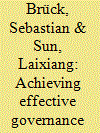

|
|
|
|
|
| Publication |
2007.
|
| Summary/Abstract |
For emerging democracies, how to reach state-society equilibriums conducive to both democratization and effective governance has been a most challenging issue. Illustrating such a predicament, in present-day Taiwan a situation of 'divided government' has been widely regarded in the literature as implying frequent legislative-executive stalemate and ineffective governance. In this article, we argue that while power games among the three conventional branches of government - the executive, legislature, and judiciary - may continue to produce a governmental stalemate equilibrium, the entry of increasingly important media and interest group players into the policy-making arena in Taiwan has shown strong potential to make up for the institutional failing of divided government. Drawing on the adoption process of the 2001 Financial Holding Company Law, we examine the conditions under which effective governance can still be achieved in Taiwan. Our analysis shows that concerted media pressure can succeed in forcing Taiwan's major parties to jointly pursue beneficial legislation. The analysis also suggests that interest group involvement in Taiwanese policy-making does not necessarily lead to crippling 'regulatory capture' but, on the contrary, can entail welfare enhancing change
|
|
|
|
|
|
|
|
|
|
|
|
|
|
|
|
| 2 |
ID:
080491
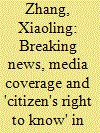

|
|
|
|
|
| Publication |
2007.
|
| Summary/Abstract |
This study examines the Chinese media's coverage of the Iraq War and SARS in 2003, that of CCTV in particular, and discusses the 'citizen's right to know' which became popularised in China during these two breaking news events. After delineating the moves that CCTV has been making, the paper argues that in the face of globalisation of information the party-state is actively involved in pursuit of image reconstruction both at home and internationally, and of having a voice in the new world order. Findings show that although the Chinese media do not lack the capacity to honor the 'citizen's right to know', the coverage of breaking news is determined by the state's perception of a given situation.
|
|
|
|
|
|
|
|
|
|
|
|
|
|
|
|
| 3 |
ID:
080496
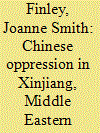

|
|
|
|
|
| Publication |
2007.
|
| Summary/Abstract |
Individuals in Xinjiang are not merely passive recipients of state representations and policies; they are also agents capable of finding subtle means of self-representation. These symbolic oppositions are necessarily fluid: they emerge, adapt and disappear in response to the changing political environment. Currently, some individuals are demonstrating symbolic resistance to the state through the vehicle of Islam itself: a return to the mosque and orthodox religious practice. This article explores the nature and source of the current Islamic renewal in Xinjiang, conceived (though not exclusively) as a vehicle of symbolic opposition to perceived Muslim oppression at national and global levels. In discussing the international dimension, I explore the role played by imported Islamic materials, pilgrimage, study abroad, and, above all, the national and global mass media
|
|
|
|
|
|
|
|
|
|
|
|
|
|
|
|
| 4 |
ID:
080495
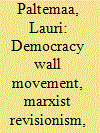

|
|
|
|
|
| Publication |
2007.
|
| Summary/Abstract |
This article analyses the Beijing Democracy Wall Movement's argumentation on democratic reforms in 1978-1981 from the perspective of the larger genre of international revisionist Marxism critical of Leninist/Stalinist political systems at the time of the movement. The movement's argumentation contained three distinct variations on the same theme of socialist democracy, which the author calls classical Marxist, eclectic Marxist and non-Marxist lines of argument. They differed in the content of proposed institutional reforms and their intellectual sources, but shared the perception of democracy as an institutional solution to the conflict between the people and a bureaucratic class that the Stalinist political system had produced in China. All lines also accepted the socialist economic system. As discussed in the article, these ideas were heavily influenced by the Radical Red Guard criticism against the Maoist New Establishment created and popularized during the Cultural Revolution, and the need to find ideological means to refute the official Maoist ideology of the Party Left at the time through a return to the original sources in Marxism. East-European revisionist Marxism also influenced these arguments directly and indirectly
|
|
|
|
|
|
|
|
|
|
|
|
|
|
|
|
| 5 |
ID:
080498
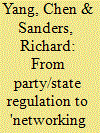

|
|
|
|
|
| Publication |
2007.
|
| Summary/Abstract |
This paper follows well publicised arguments in December 2004 between Gu Chujun, the controversial board chairman of the large Chinese refrigerator maker, Guangdong Kelon Electrical Holding Co, and Lang Xianping, a Hong Kong economics professor, over the drain on state assets resulting from the privatisation of state-owned enterprises. The Kelon affair triggered a nationwide public debate on further reform of state-owned enterprises (SOEs). The exchange of criticism continued after Gu Chujun was detained in the midst of a corporate scandal in August 2005. At the end of the debate, it was asserted by many observers that the Kelon case was a wake-up call to the Chinese authorities and that more aggressive and effective supervision of listed companies was urgently needed to ensure the appreciation of state assets. This article argues that the building of the institutions of corporate government, as a counterpart to the establishment of property rights institutions, has been a creative process within China-in-transition over the past two decades. Yet the Kelon affair reveals a series of accumulated difficulties with regard to corporate governance reform of Chinese publicly listed companies and its associated institutions. Corporate governance institution-building has been moulded, particularly since 1997 onwards, by the neo-classical apotheosis of unbridled meritocracy with private property rights and shareholder-oriented corporate governance mechanisms as its two poles. The analysis indicates that, as a result, corporate governance restructuring of Chinese publicly listed companies has become opaque with one-sided outcomes in favour of managers and local officials, and, as such, inevitably carries the seeds of its own destruction
|
|
|
|
|
|
|
|
|
|
|
|
|
|
|
|
| 6 |
ID:
080492
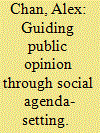

|
|
|
|
|
| Publication |
2007.
|
| Summary/Abstract |
Guidance of public opinion (yulun daoxiang) became the buzzword of the Chinese government's media policy from the 1990s. I illustrate this idea through borrowing the concept of agenda-setting from media studies. Partly, its introduction was a response to the crisis of the propaganda model in the mid-1980s. Recognizing its declining ability to control what people think, the party state shifted its focus from political ideology to social agenda. The guidance of public opinion is indirect, flexible and subtle in nature. It allows the state-controlled media to address people's daily concerns. Also, it realizes that responsiveness to public opinion is the key to guiding that opinion effectively. The media need to guide public opinion 'correctly', so as to promote political unity, social stability, and boost morale. An argument is advanced that the party state seeks to accomplish attention management through agenda-setting
|
|
|
|
|
|
|
|
|
|
|
|
|
|
|
|
| 7 |
ID:
080499


|
|
|
|
|
| Publication |
2007.
|
| Summary/Abstract |
This article explores the enduring impact of the Western strategy of 'peaceful evolution' (heping yanbian) on China's political security. This non-military strategy is given an added significance in an era of the lone superpower, when American military might can provide the buttress. 'Peaceful evolution' can also overlap with the US notion of 'regime change', which often entails military intervention to bring about a desired political transformation in a particular state. Specifically, the strategy of 'peaceful evolution' still constitutes a serious threat to China because it needs to continue opening up to the West for the sake of economic modernisation
|
|
|
|
|
|
|
|
|
|
|
|
|
|
|
|
| 8 |
ID:
080493


|
|
|
|
|
| Publication |
2007.
|
| Summary/Abstract |
It is clear that public support for democracy is high in China. Public opinion surveys show that more than 90% of Chinese citizens believe that having a democracy is good. But the majority is not yet ready for a major effort towards democratization because they still see economic growth and social stability as more important than freedom of speech, political participation, and other democratic rights. However, more and more people are growing up with the belief that political rights and freedom supersede economic wellbeing or other materialist goals. In 15-20 years, Chinese society will be dominated by people with such beliefs. We can be cautiously optimistic about the prospects for democratic change in China
|
|
|
|
|
|
|
|
|
|
|
|
|
|
|
|
| 9 |
ID:
080494


|
|
|
|
|
| Publication |
2007.
|
| Summary/Abstract |
Village elections at the grassroots level have been regularly conducted for more than a decade in the context of the Chinese political system. Both negative and positive views have been expressed and written on village elections. How does one evaluate Chinese village elections? Free and fair elections require conformity to international election principles, rules, and procedures. This study develops a minimum procedural criterion to assess if village elections have followed internationally-accepted rules and procedures of free and fair elections. We also measure the meaningfulness of village elections by examining the effects of elections on village governance and villagers' life. We find that elections have been conducted in a manner consistent with proscribed rules and procedures and are generally free and fair, and there is a considerable convergence of views of villagers and cadres who see that elections are meaningful in producing positive changes in village governance and life. The data also confirm that elected villagers' committees are still in the long shadow of township governments and village Party branches
|
|
|
|
|
|
|
|
|
|
|
|
|
|
|
|
|
|
|
|
|